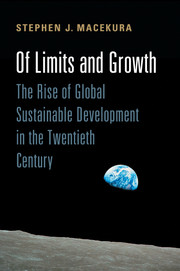Book contents
- Frontmatter
- Contents
- List of Illustrations
- Acknowledgments
- Introduction: NGOs and the Origins of “Sustainable Development”
- PART ONE ORIGINS
- PART TWO REFORMS
- 4 When Small Seemed Beautiful: NGOs, Appropriate Technology, and International Development in the 1970s
- 5 Leveraging the Lenders: The Quest for Environmental Impact Statements in the United States and the World Bank
- 6 Conservation for Development: The World Conservation Strategy and the Rise of Sustainable Development Planning
- PART THREE PERSISTENT PROBLEMS
- Conclusion: The Growth and Limits of NGOs
- Archives
- Index
6 - Conservation for Development: The World Conservation Strategy and the Rise of Sustainable Development Planning
from PART TWO - REFORMS
Published online by Cambridge University Press: 05 July 2015
- Frontmatter
- Contents
- List of Illustrations
- Acknowledgments
- Introduction: NGOs and the Origins of “Sustainable Development”
- PART ONE ORIGINS
- PART TWO REFORMS
- 4 When Small Seemed Beautiful: NGOs, Appropriate Technology, and International Development in the 1970s
- 5 Leveraging the Lenders: The Quest for Environmental Impact Statements in the United States and the World Bank
- 6 Conservation for Development: The World Conservation Strategy and the Rise of Sustainable Development Planning
- PART THREE PERSISTENT PROBLEMS
- Conclusion: The Growth and Limits of NGOs
- Archives
- Index
Summary
In September 1975, the International Union for the Conservation of Nature (IUCN) met for their Thirteenth General Assembly in Kinshasa, Zaire. The meeting was fraught with tensions. For one, the event host, Zaire's dictatorial leader Mobutu Seso Seko, had armed guards patrol meetings and often made quick, unexpected schedule changes that left participants nervous and aggravated. More deeply, however, conflicts within the organization that had been simmering for years finally erupted. The IUCN had spent the past two decades trying to make the case for environmental protection as countries pursued economic development, often defining the two concepts as irreconcilable. By the mid-1970s, some officials had begun to wonder whether it would be more desirable and effective for nations to fold conservation principles into their development planning from the start – to emphasize “conservation's value as an instrument for sound development everywhere” as the IUCN's 1974 annual report suggested. Yet others remained skeptical of making such a shift, believing that the organization should hew closely to their older focus on species and landscape protection. In Kinshasa, debates over how to define the organization's purpose exacerbated anxieties over other issues – such as whether the IUCN was becoming too bureaucratic and whether it had forged too many ties with the UN system – and deeply frustrated participants. The meeting, later dubbed the “Night of the Long Knives,” ended with a “bad-tempered” session of the group's executive board, a dramatic overhaul in the group's leadership, and widespread confusion, uncertainty, and anger among its members.
The Kinshasa meeting and the many similar debates over the direction of environmental activism attested to the fact that the IUCN and many other environmental non-governmental organizations (NGOs) were at a crossroads in the 1970s. Activists could celebrate movements pushing to rethink development, such as the appropriate technology movement, and growing awareness of the need for accountability mechanisms, such as impact statements, to rein in development lenders. Yet the desire for economic development continued to captivate leaders across the world, and many nations still resisted comprehensive environmental protection policies. Powerful questions hung over the purpose of environmental NGOs toward the Global South: How could groups such as the IUCN convince leaders in developing countries to include conservation in their development strategies? And to what extent should activists place conservation in service of economic objectives?
- Type
- Chapter
- Information
- Of Limits and GrowthThe Rise of Global Sustainable Development in the Twentieth Century, pp. 219 - 258Publisher: Cambridge University PressPrint publication year: 2015



